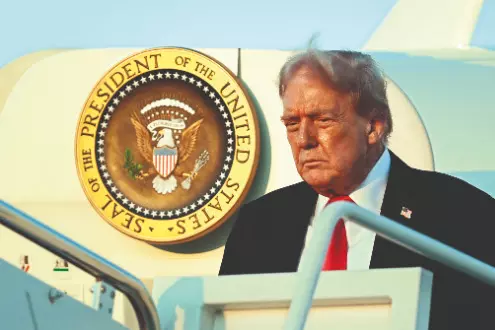Trump turns spotlight from India to China in his latest tariff push

Washington: US President Donald Trump has shifted his criticism from India to China, warning of sweeping tariffs and pressing NATO allies to halt purchases of Russian oil. In a post on Truth Social, Trump urged Western nations to adopt “major sanctions” against Moscow and floated tariffs of up to 100 per cent on Chinese imports, a call that drew a sharp response from Beijing, where Foreign Minister Wang Yi said that “war cannot solve problems, and sanctions only complicate them,” stressing that China supports dialogue over punitive measures.
Trump’s remarks came a day after Washington urged G7 countries to consider imposing tariffs on nations continuing to buy Russian oil. The president declared that he was ready to move ahead with sanctions if NATO members agreed to act collectively. “NATO’s commitment to win has been far less than 100%, and the purchase of Russian oil, by some, has been shocking,” he wrote, arguing that such imports undercut the alliance’s bargaining position against Moscow.
According to Trump, tariffs on Chinese goods would not only hit Beijing’s economy but also help end the Ukraine conflict. “China has a strong control, and even grip, over Russia, and these powerful tariffs will break that grip,” he said, adding that duties ranging from 50 to 100 per cent would weaken Moscow’s ability to sustain the war.
Reiterating his long-standing claim that the Ukraine conflict would not have started under his leadership, Trump said, “It is Biden’s and Zelenskyy’s war. I am only here to help stop it, and save thousands of Russian and Ukrainian lives. If NATO does as I say, the war will end quickly, and all of those lives will be saved! If not, you are just wasting my time and the time, energy, and money of the United States.”
The United States already levies an additional 30 per cent tax on Chinese imports, while Beijing has retaliated with a 10 per cent duty on American goods. Earlier this year, Trump briefly raised tariffs on Chinese products to 145 per cent before both governments agreed in May to end their tit-for-tat tariff escalation.
On Friday, Treasury Secretary Scott Bessent and US Trade Representative Jamieson Greer held a call with G7 finance ministers to press for broader restrictions on Russian energy purchases. The Treasury Department later said Bessent had echoed Trump’s position, telling partners that a united front was necessary. “Only with a unified effort that cuts off the revenues funding Putin’s war machine at the source will we be able to apply sufficient economic pressure to end the senseless killing,” Bessent said.
China, however, firmly rejected the approach. Wang Yi, during talks with Slovenian Foreign Minister Tanja Fajon, told reporters that sanctions would not resolve the crisis. “China does not participate in or plan wars, and what China does is to encourage peace talks and promote political settlement of hotspot issues through dialogue,” he said. Chinese state media reported Wang as calling Beijing “a responsible major country” with “the best record on peace and security issues.”
While US officials did not directly name India or China in their statements, both countries have continued to buy discounted Russian oil despite Western pressure. Trump, who had earlier criticized New Delhi for those purchases, has now shifted focus toward Beijing, casting China’s trade relationship with Russia as central to prolonging the war in Ukraine.



